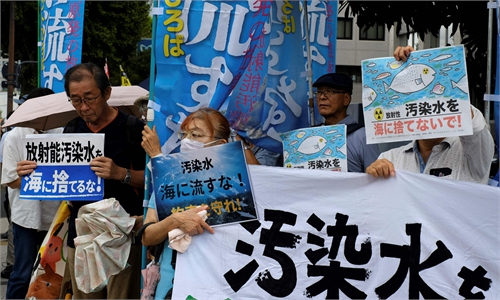
Japan's reckless dumping of nuclear wastewater poses a grave danger to Earth. Cartoon: Carlos Latuff
Simply to save money, Japan is set to dump Fukushima nuclear-contaminated wastewater into the ocean starting on Thursday. However, it is foreseeable that Japan's irresponsible behavior will result in serious economic consequences. Asian countries need to work together to minimize the negative effects while also figuring out acceptable solutions to help avoid possible economic chaos.Ahead of Japan's planned move to dump the contaminated wastewater, media reports said some South Korean shoppers are buying salt and seafood in bulk, and retailers are stockpiling products in fears of a supply shortage. Although South Korean officials have been actively working to reduce public unease about the dumping of the nuclear-contaminated water, it has had little effect.
What is undeniable is that Japan's irresponsible behavior will have a negative impact far and wide, creating problems and even economic chaos for Asia.
The first thing to consider is the agriculture, animal husbandry and fishery sectors. For instance, fishing industry groups in Japan and the wider region have voiced concerns about their livelihoods, as they fear consumers will avoid buying seafood.
Nuclear-contaminated water would make people around the world lose confidence in Japan's seafood and marine products, which could deal a blow to the country's fishing industry and thus the Japanese economy. This will send a shock wave across global markets, with Asian economies among the first to feel the pain.
Japan is surrounded by some of the world's richest fishing grounds. If Japan starts dumping nuclear-contaminated water from the tsunami-hit Fukushima nuclear power plant into the Pacific Ocean, the move will inevitably add to the multiple crises and growing challenges facing some Asian economies.
At the very least, the risk of a global fishery industry crisis has arisen, and Asia will be the epicenter of the disaster. We should be prepared for a worst-case scenario amid a possible restructuring of the fishery supply chain.
While it may be too early to accurately assess the damage Japan's nuclear-contaminated water would cause to the Asian economy, economic problems exposed by Japan's irresponsible behavior are alarming for policymakers in Asian countries. Asian economies should strengthen cooperation to address potential economic risks and chaos.
First, cooperation should be enhanced to ease a possible supply shortage of seafood and marine products. The prices of marine products are expected to increase if there is a supply shortage, and this will perhaps exacerbate inflation concerns in Asian countries. Emergency measures should be taken to ensure market stability, especially for low-income groups. In this process, cooperation is necessary in releasing food reserves and other aspects.
Second, losses in the real economy will probably cause turmoil in the financial system, and eventually the stock market. Some analysts said a weak yen, high inflation and rising unemployment might compel Japan to tighten monetary policy soon. It remains to be seen whether Japan's nuclear-contaminated water will exacerbate financial turmoil in Asia and create more economic risks. Asian countries need to strengthen financial coordination and cooperation to ensure market stability.
Third, the ocean economy accounts for a significant part of some developing economies of Asia and the Pacific, and many people in the region depend on the ocean for their livelihoods. Policymakers in Asian countries should strengthen cooperation to ensure the sustainable development of the marine economy.
It is extremely selfish and irresponsible for the Japanese government to announce its decision to dump nuclear-contaminated water into the ocean, and by doing so, Japan is putting its selfish interests above the regional economy and disrupting Asian supply chains.
Asian economies should take all steps necessary to protect the marine environment, ensure food safety and safeguard people's lives and health. In this process, regional cooperation is the best way to mitigate risks in uncertain times.
The author is a reporter with the Global Times. bizopinion@globaltimes.com.cn



